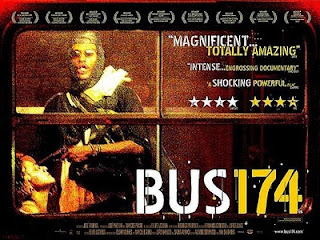AFED #64: Ônibus 174 [Bus 174) (Brazil, 2002); Dir. José Padilha & Felipe Lacerda
In Rio de Janeiro, in June 2000, 21 year-old Sandro Rosa do Nascimento, a young man from an impoverished background, boarded a public bus and held its passengers at gunpoint. What started as an armed robbery rapidly turned into a hostage situation as the police arrived, beginning a four hour stand-off that was captured by television crews and broadcast live to the nation.
The incident became a cause célèbre, highlighting issues both about the state of Brazilean policing and the plight of those less privileged in the country. Made two years after the event Padhila and Lacerda's documentary interviews many of those involved that day - including hostages and police - as well as exploring Sandro's story and the desperate circumstances that led him to attempt the robbery.
For those of us not familiar with the original event it plays out like a tense drama, albeit one from which we suspect not all the principals are going to come out alive. Naturally much use is made of the television footage at the time but it's the added insight of the participants and their families that transforms the raw material into a tragedy where any number of different circumstances and decisions might have led to a more fortunate outcome.
It's impossible for most of us not to sympathise with Sandro, who had witnessed his mother stabbed to death as a young boy and run away to live on the streets. With depressing predictability a rootless, hand-to mouth existence led to drug abuse, petty crime and eventually imprisonment. But what's most sickening is the callous way in which the 'invisible' street children are treated by Brazilian society and a corrupt police force who think nothing of killing them.
For Sandro, who had witnessed the 1993 Candelária massacre, in which eight young people were killed by the police, the decision to hijack the bus almost appears to have become an act of self-validation, a demonstration of his own worth. Those who knew him indicate he was not a violent person and the effects of cocaine may have contributed to his fateful decision that day.
We should probably treat this with a little circumspection, but the sickening final twist to the story will leave many outraged by the callousness and inhumanity of the police. The differing responses to Sandro's fate are a clue to the pervasive ambivalence in Brazil to the issue of street children and an indicator why the country remains a long way from finding a solution.
A powerful and provocative documentary.
The incident became a cause célèbre, highlighting issues both about the state of Brazilean policing and the plight of those less privileged in the country. Made two years after the event Padhila and Lacerda's documentary interviews many of those involved that day - including hostages and police - as well as exploring Sandro's story and the desperate circumstances that led him to attempt the robbery.
For those of us not familiar with the original event it plays out like a tense drama, albeit one from which we suspect not all the principals are going to come out alive. Naturally much use is made of the television footage at the time but it's the added insight of the participants and their families that transforms the raw material into a tragedy where any number of different circumstances and decisions might have led to a more fortunate outcome.
It's impossible for most of us not to sympathise with Sandro, who had witnessed his mother stabbed to death as a young boy and run away to live on the streets. With depressing predictability a rootless, hand-to mouth existence led to drug abuse, petty crime and eventually imprisonment. But what's most sickening is the callous way in which the 'invisible' street children are treated by Brazilian society and a corrupt police force who think nothing of killing them.
For Sandro, who had witnessed the 1993 Candelária massacre, in which eight young people were killed by the police, the decision to hijack the bus almost appears to have become an act of self-validation, a demonstration of his own worth. Those who knew him indicate he was not a violent person and the effects of cocaine may have contributed to his fateful decision that day.
We should probably treat this with a little circumspection, but the sickening final twist to the story will leave many outraged by the callousness and inhumanity of the police. The differing responses to Sandro's fate are a clue to the pervasive ambivalence in Brazil to the issue of street children and an indicator why the country remains a long way from finding a solution.
A powerful and provocative documentary.




top quality blogging from the master
ReplyDelete